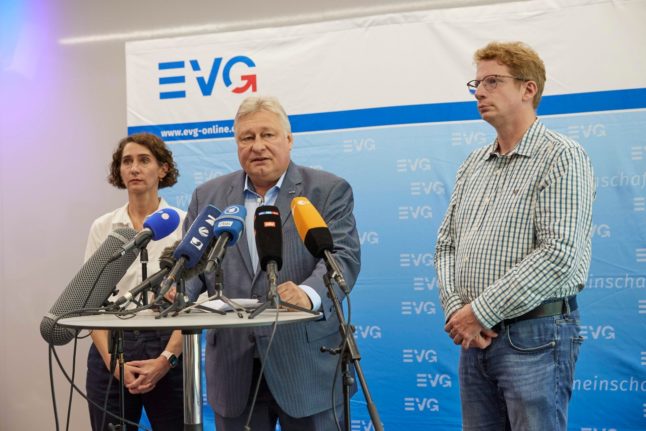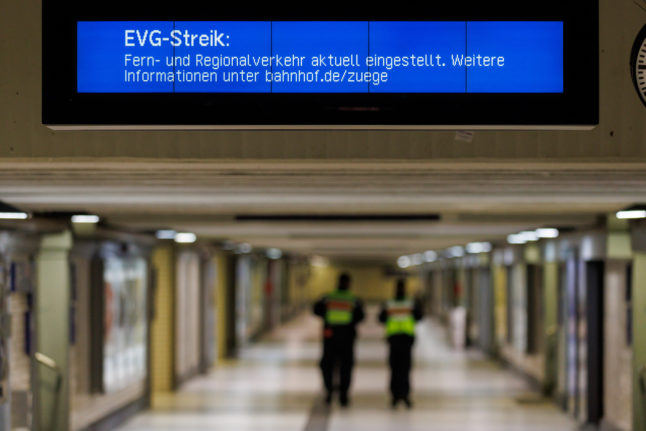BREAKING: German rail union to hold ballot on unlimited strikes

After intensive talks with Deutsche Bahn broke down on Wednesday, German rail union EVG is holding a ballot to decide whether to call a prolonged national strike.
On Wednesday, whispers emerged that the talks were nearing a breakthrough - but by the evening, they had broken down. Following an intensive week and a half of talks, the pay negotiations between Deutsche Bahn and major rail union EVG have ended without a solution, with the union declaring it would call a ballot on unlimited strikes.
At a press conference on Thursday afternoon, EVG chair Martin Burkert announced that potential weeks-long strikes were on the table and called on Deutsche Bahn to "step up its game".
"We will now go into preparations for the strike ballot, with all the consequences that entails," he said. "Unlimited strikes will become possible as a result."
The process of voting could last around four to five weeks and a minimum of 75 percent of members would need to vote in favour in order of the motion to be passed. In the run-up to the results, warning strikes were still possible, Burkert said.
Nevertheless, the union was "still ready to negotiate", he added.
The two sides had been attempting to find a solution to an ongoing battle on wages that has lasted for several months and involved seven rounds of pay negotiations, but have reached a deadlock on the duration of the newly negotiated contract.
In a statement on Wednesday evening, EVG declared the latest pay offer from Deutsche Bahn to be "too low and too late".
"Against the background of the demands agreed in Fulda at the time, the term of 27 months in particular was judged to be significantly too long and the wage increase offered to be too low and too late," the union said.

EVG chair Martin Burkert speaks at a press conference on Thursday. Photo: picture alliance/dpa | Jörg Carstensen
EVG has been calling for a 12 percent pay rise or at least €650 extra per month for its members over 12 months - at which time pay negotiations would be reopened. This has been a key issue for the union after the union signed a long contract back in 2020 that prevented them from responding the steep rise in the cost of living.
Meanwhile, Deutsche Bahn has countered with a staggered 12 percent increase for lower earners, 10 percent for middle earners and eight percent for top earners - but with a duration of 27 months.
In terms of a minimum pay increase, the state owned rail operator was allegedly prepared to pay up to €400 extra per month. This is similar to the amount EVG has negotiated for employers of smaller region rail operators in recent weeks.
READ ALSO: EXPLAINED: How to get compensation for delayed or cancelled trains in Germany
In a damning statement released on Wednesday, DB personnel chief Martin Sieler slammed the union for breaking talks off at what he described
"The bodies of EVG are not willing to compromise." he said. "The ones who suffer are our employees and our passengers."
Sieler said EVG's decision to end discussions reduced days of tough talks to nothing, despite the fact that a new contract was nearing completion.
"An agreement was within reach, 140 pages of collective agreement text are already prepared," he explained. "What is happening now is unbelievable."
What happens next?
EVG is set to poll its members to decide whether workers should lay down their tools for an unlimited period of time. If they vote in favour of unlimited strikes, they union says it will give plenty of notice to allow travellers to make other plans.
The decision means that the summer holidays in several federal states could now be disrupted by cancelled trains and lengthy delays. Holidays have already begun in North Rhine-Westphalia, followed on July 6th by Lower Saxony, Bremen and Saxony-Anhalt.
Back in March, the union called a 'mega strike' alongside services union Verdi that paralysed Germany's national and local rail networks for a day, and in May, a 50-hour national rail strike was called off at the last minute after Deutsche Bahn challenged the move in a Frankfurt court.
However, since then, EVG has repeatedly warned that the next round of strikes will be much more impactful than the first, with industrial action potentially lasting for "weeks".

"EVG strike. Long-distance and regional services currently suspended" is written on a display board at the main train station in Nuremberg. With a large-scale nationwide warning strike, the EVG will shut down train travel across much of the country. Photo: picture alliance/dpa | Daniel Karmann
Under German labour law, unions are only permitted to call warning strikes when negotiations are ongoing, and must define a clear start and end date for the walk-outs. Once negotiations are deemed to have failed, however, so-called unlimited strikes - with no fixed end date in sight - can be used to put pressure on employers.
However, another option is for Deutsche Bahn and EVG to sit down for another round of talks, or for both sides to involve an arbitration committee that would seek to reach a conclusion on behalf of both parties.
This was the route taken by Verdi back in April in its negotiations with the municipalities over pay for local transport workers. In the end, the union agreed to the committee's recommendation of a 5.5 percent pay rise over 24 months and a one-off tax-free bonus of €3,000 to compensate for inflation.
READ ALSO: German public sector workers clinch 5.5 percent pay rise
Comments
See Also
On Wednesday, whispers emerged that the talks were nearing a breakthrough - but by the evening, they had broken down. Following an intensive week and a half of talks, the pay negotiations between Deutsche Bahn and major rail union EVG have ended without a solution, with the union declaring it would call a ballot on unlimited strikes.
At a press conference on Thursday afternoon, EVG chair Martin Burkert announced that potential weeks-long strikes were on the table and called on Deutsche Bahn to "step up its game".
"We will now go into preparations for the strike ballot, with all the consequences that entails," he said. "Unlimited strikes will become possible as a result."
The process of voting could last around four to five weeks and a minimum of 75 percent of members would need to vote in favour in order of the motion to be passed. In the run-up to the results, warning strikes were still possible, Burkert said.
Nevertheless, the union was "still ready to negotiate", he added.
The two sides had been attempting to find a solution to an ongoing battle on wages that has lasted for several months and involved seven rounds of pay negotiations, but have reached a deadlock on the duration of the newly negotiated contract.
In a statement on Wednesday evening, EVG declared the latest pay offer from Deutsche Bahn to be "too low and too late".
"Against the background of the demands agreed in Fulda at the time, the term of 27 months in particular was judged to be significantly too long and the wage increase offered to be too low and too late," the union said.

EVG has been calling for a 12 percent pay rise or at least €650 extra per month for its members over 12 months - at which time pay negotiations would be reopened. This has been a key issue for the union after the union signed a long contract back in 2020 that prevented them from responding the steep rise in the cost of living.
Meanwhile, Deutsche Bahn has countered with a staggered 12 percent increase for lower earners, 10 percent for middle earners and eight percent for top earners - but with a duration of 27 months.
In terms of a minimum pay increase, the state owned rail operator was allegedly prepared to pay up to €400 extra per month. This is similar to the amount EVG has negotiated for employers of smaller region rail operators in recent weeks.
READ ALSO: EXPLAINED: How to get compensation for delayed or cancelled trains in Germany
In a damning statement released on Wednesday, DB personnel chief Martin Sieler slammed the union for breaking talks off at what he described
"The bodies of EVG are not willing to compromise." he said. "The ones who suffer are our employees and our passengers."
Sieler said EVG's decision to end discussions reduced days of tough talks to nothing, despite the fact that a new contract was nearing completion.
"An agreement was within reach, 140 pages of collective agreement text are already prepared," he explained. "What is happening now is unbelievable."
What happens next?
EVG is set to poll its members to decide whether workers should lay down their tools for an unlimited period of time. If they vote in favour of unlimited strikes, they union says it will give plenty of notice to allow travellers to make other plans.
The decision means that the summer holidays in several federal states could now be disrupted by cancelled trains and lengthy delays. Holidays have already begun in North Rhine-Westphalia, followed on July 6th by Lower Saxony, Bremen and Saxony-Anhalt.
Back in March, the union called a 'mega strike' alongside services union Verdi that paralysed Germany's national and local rail networks for a day, and in May, a 50-hour national rail strike was called off at the last minute after Deutsche Bahn challenged the move in a Frankfurt court.
However, since then, EVG has repeatedly warned that the next round of strikes will be much more impactful than the first, with industrial action potentially lasting for "weeks".

Under German labour law, unions are only permitted to call warning strikes when negotiations are ongoing, and must define a clear start and end date for the walk-outs. Once negotiations are deemed to have failed, however, so-called unlimited strikes - with no fixed end date in sight - can be used to put pressure on employers.
However, another option is for Deutsche Bahn and EVG to sit down for another round of talks, or for both sides to involve an arbitration committee that would seek to reach a conclusion on behalf of both parties.
This was the route taken by Verdi back in April in its negotiations with the municipalities over pay for local transport workers. In the end, the union agreed to the committee's recommendation of a 5.5 percent pay rise over 24 months and a one-off tax-free bonus of €3,000 to compensate for inflation.
READ ALSO: German public sector workers clinch 5.5 percent pay rise
Join the conversation in our comments section below. Share your own views and experience and if you have a question or suggestion for our journalists then email us at [email protected].
Please keep comments civil, constructive and on topic – and make sure to read our terms of use before getting involved.
Please log in here to leave a comment.